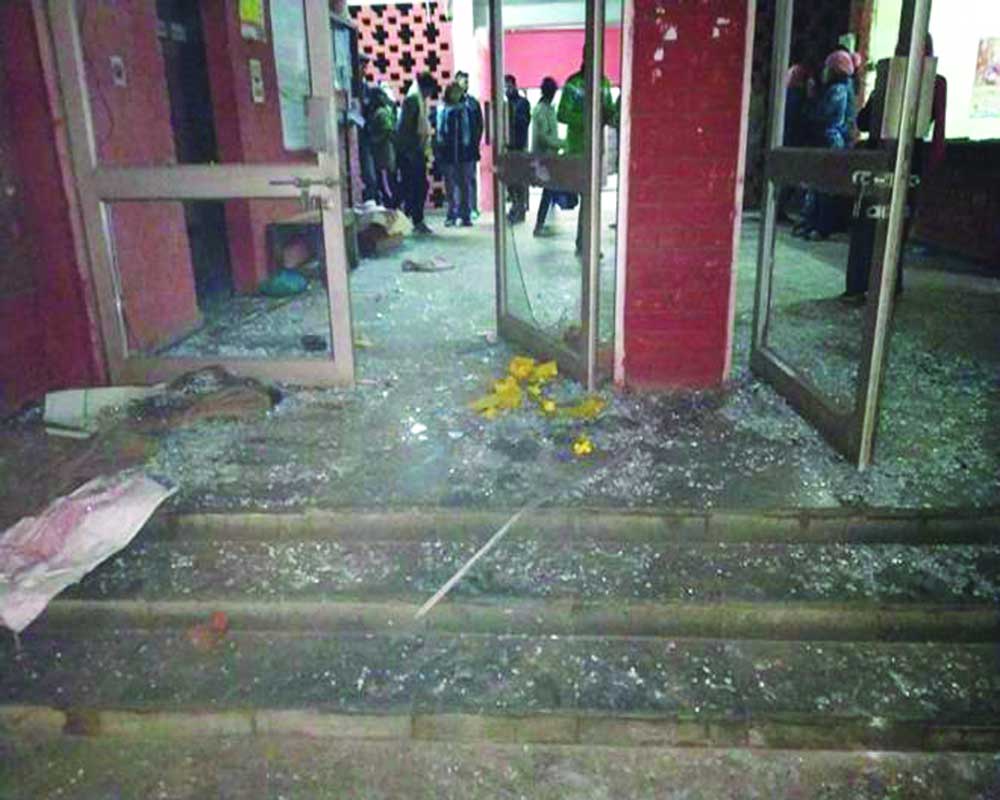Students are not enemies of the State and help create balance in a democracy. The muzzling of JNU is not acceptable
Nelson Mandela’s words certainly couldn’t have been more apt following the brutal attack on students and teachers at Jawaharlal Nehru University (JNU) by a mob out to muzzle dissenting voices — “There can be no keener revelation of a society’s soul than the way in which it treats its children.” Here, we have made them traitors to the cause, an enemy of the State. Just for speaking out their mind. Yes, we have become soulless. Yes, democracy is a paper town. Yes, education is anti-thought and is meant to bloom only a certain kind of political ideology. Yes, we are eroding our own tradition of the gurukul as an enabling environment and free space for learning and wisdom. Where teachers were more than mentors, they were parental figures, like the JNU professors who tried to form a protective ring around their students but were beaten up nevertheless. In the Indic tradition, such centres of learning were deliberately located far away from the seat of power, where princes, too, were stripped off their glory, lest the trappings of privilege clouded their understanding of life as it was meant to be. It was a safe and equal space for everybody. As a parental generation, we have scarred our youth and are the actual killers of their free spirit. No words would be enough for the condemnation of the violence at JNU. But the message it sends out is frightening to say the least. Though both the Left and Right wings have fiercely debated their viewpoints over the years and hotly contested each other, never have they descended into chaos. Since when have ideological differences assumed battleship positions? Aren’t we hypocritical in teaching our young to question the status quo, encouraging them to think out of the box, be our moral counterpoint and then keep them under our thumbs? These are fundamental questions that we must ask ourselves than taking positions based on political convenience. Unmask the thugs, whoever they are.
Politically, this is nothing but a manifestation of State terror. How else can one explain the passive behaviour of the policemen, clearly tools of the State and executors of law and order? Even if the V-C didn’t clear their entry, could they have not stopped the mayhem to preserve the rule of law? Not only were they silent witnesses to the rampage, most accounts corroborate that they allowed the miscreants inside. Could anybody be blamed for not assuming that they were under orders? Of course, both the Left and Right students’ outfits were caught in a war of accusations and counter-accusations in social media videos and accounts as to who got in the marauders. But then, even going by circumstantial evidence, the Left controls the students’ union, is best placed to fight for students’ rights on its terms and would not need to shed blood of its chief. The Left ideology survives in dots in campuses and has virtually been eroded in the mainstream political space. Sponsoring a headline-making moment at JNU frankly would not be a drumroll for its return and doesn’t stand to logic. Yet the nature of crackdowns on students in top liberal institutions, particularly those that are renowned internationally — be it a JNU, IIT or Jamia — and intimidation of protesting students elsewhere do imply a grander design of Right-wing hegemony over a nation’s thought factories. And, therefore, lends much credence to the theory that this is very much manipulated and orchestrated rather than a clash of various students’ groups. This isn’t about a fee hike or the Citizen Amendment Act (CAA). It is about the democratic pact to agree to disagree and co-exist despite those differences. It isn’t about the politics of otherisation at all but of the right of the other to be heard. It isn’t about majoritarianism, which will never be under threat, but a fear and insecurity of losing it that looks at destruction by force rather than consolidation by winning faith. Finally, public university campuses need to be a free space for debate, discussion and learning for students coming in from all corners of the country, diverse backgrounds, religion and class. They will shape and take forward the democracy of the future. That is why the unprecedented attack on the JNU campus is unacceptable, simply because we are telling students what to do, not encouraging them to find their way. Whether this crackdown will indeed end up scaring a generation, tire them out with the futility of the goal or embolden them further remains to be seen. But it is important that protests be peaceful and sustained. JNU students will continue with democratic debate and dialogue while students in Mumbai are going to “occupy Gateway of India” non-stop. And for those shouting “Bharat Mata Ki Jai,” they shouldn’t have devalued something that stirs us emotionally by assaulting women in their hostel in the dark of the night.

























